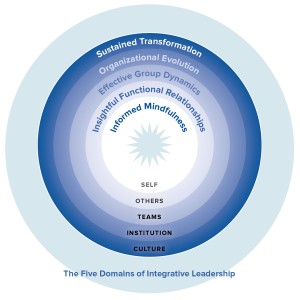We have all thrown a pebble into a pond and watched the ripples spread out across the water. One small stone entering the water can affect the entire pond. Leaders in Integrative Healthcare who have the opportunity and responsibility to bring about transformative change within their organization are, in fact, being given the opportunity to be that pebble. By Adam Perlman, MD.
For Integrative Leadership, the essence of that pebble is “informed mindfulness.”
Informed mindfulness is a concept that connects mindful self-awareness and self-regulation with educated decision-making. The mindful person is aware, non-judgmentally, of what is occurring in the present moment and understands that his or her response is a choice. With informed mindfulness, as situations arise and decision points are faced, that same person is able to place what is happening in its larger context and, having clear values and being sufficiently educated, make an informed choice within that moment.
This concept — self-awareness and self-regulation coupled with knowledge, skills, values, and wisdom — forms the foundation of Integrative Leadership.
Leaders who have developed informed mindfulness are aware of how they operate in the world with and in relationship to the qualities of integrity, authenticity, compassion, courage, empathy, humility and passion. They are committed to increasing their own capacities for these qualities, not just for self-improvement but also as a means to bring about cultural transformation and social change.
 When mindfully-informed leaders enter the pond, they make waves that ripple out from self to others. The Integrative Leader understands that every success is dependent upon nurturing insightful, functional relationships with others who are willing to support the vision and champion the larger transformation of healthcare.
When mindfully-informed leaders enter the pond, they make waves that ripple out from self to others. The Integrative Leader understands that every success is dependent upon nurturing insightful, functional relationships with others who are willing to support the vision and champion the larger transformation of healthcare.
Through relationship building, the Integrative Leader cultivates and unifies mindful teams. In turn, these teams develop their own relationships with others, and as they create effective group dynamics whenever and wherever they interact, they expand the depth of the evolution throughout the organization. As more individuals embrace the vision through the demonstration of value and the creation of win-win alliances, a feeling of ownership for the evolution permeates its culture.
Such cultural evolution leads, inevitably, to a sustained transformation.
THE TRANSFORMATIVE PROCESS
To reiterate, the five domains of Integrative Leadership illuminate the transformation process that will result is sustained transformation. These are:
- ONE: The transformative process for an organization begins with its leaders and with the development of their internal states of being.
- TWO: Insightful, functional relationships are the means by which potential within others is unleashed and new futures are created.
- THREE: Fostering effective group dynamics to build high functioning teams creates the engine that drives transformative change. As Margaret Wheatley explains, real change only happens when, “networks of relationships form among people who discover they share a common cause and vision of what’s possible.”
- FOUR: Encouraging individual ownership of the vision and creating win-win alliances and collaborative efforts will overcome resistance and hasten the process of widespread organizational transformation.
- FIVE: The demonstration of value and the use of processes that nurture continued organizational mindfulness will harness ongoing collective creativity and ensure sustainability.
Healthcare is a dynamic system and as such requires a dynamic approach by those who find themselves in a position of leadership. Although sustained transformation of the system is the ultimate goal, that transformation and the ability to sustain it, will require continued effort and evolution.
Always remember, one small pebble entering the water can affect the entire pond.
For more on the Leadership Program In Integrative Healthcare at Duke University, click here.
WHITE PAPER, PEBBLE IN THE POND AVAILABLE HERE FOR REGISTERED USERS





